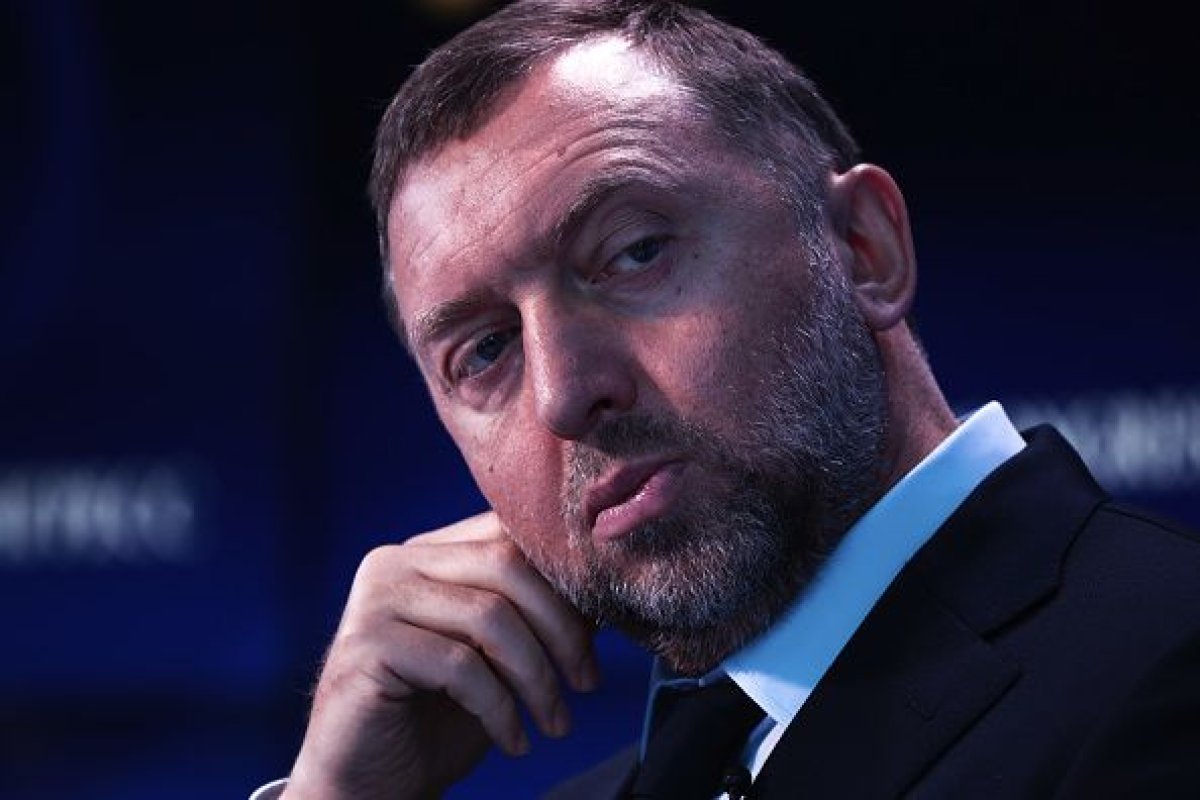After eight months of lobbying to be taken off the U.S. sanctions list, companies tied to the Russian aluminum magnate Oleg Deripaska got their wish on Wednesday.
The Treasury Department notified Congress on Wednesday that it plans to remove three companies belonging to Deripaska, a Russian oligarch with close ties to Russian President Vladimir Putin, from the sanctions list on the condition that Deripaska relinquishes control over his companies.
Deripaska was sanctioned in April 2018, along with six other Russian oligarchs, for supporting Russia's efforts to meddle in the internal affairs of Western governments and for a handful of other offenses related to Russia's activities in Syria and Ukraine.
The energy companies EN+, Rusal, and ESE were also sanctioned due to their relationship with Deripaska. Experts at the time noted that it would be impossible to hit the oligarch financially without forcing the companies to sever their ties with him or face sanctions.
Now, it appears that these efforts have paid off and Deripaska will lose control of the companies with which he built his career and fortune. But some observers have questioned why the ultimate beneficiaries of the deal are entities with legal problems and close ties to the Kremlin: the Swiss commodities firm Glencore, which has done business with Deripaska for years, and the Russian bank VTB (nicknamed "Putin's piggy bank"), which was allegedly going to finance a Trump Tower in Moscow.
"There are lots of reasonable suspicions that VTB and Glencore are involved in other aspects of these schemes. So what assurances do we have that Deripaska doesn't have influence over them or that other bad actors aren't taking control?" Jed Shugerman, a professor at Fordham Law, told Newsweek.
"It's part of Putin's MO to play oligarchs off of each other and simply replace them with other oligarchs. How do we know this isn't just Putin taking Deripaska out of the game and replacing him with his cronies in VTB and other co-conspirators now that Deripaska's name is known?" Shugerman added.

The lifting of sanctions hinges on an agreement that the three energy companies restructure their corporate governance so that Deripaska no longer owns a 50 percent share. According to the restructuring agreement between the Office of Foreign Assets Control (OFAC) and the three companies, EN+ will take ownership of both Rusal and ESE. Deripaska, meanwhile, will reduce his share of EN+ from 70 percent to 44.95 percent, and will have almost no ownership of ESE or Rusal.
"As part of this agreement, half of EN+'s restructured board of directors will be comprised of U.S. or UK nationals and Rusal's current board chairman will step down. Deripaska will remain sanctioned," a letter to Senate Majority Leader Mitch McConnell read.
"OFAC has secured from Petitioners a binding agreement that severs Deripaska's control over these critical revenue-generating entities and reduces his ownership in these entities below 50 percent, thereby untangling and protecting these companies from the controlling influence of a Kremlin insider," the letter continued.
The companies had, in fact, been negotiating aggressively for this very arrangement. They enlisted the aid of the Washington D.C. lobbying firm Mercury Public Affairs, which, coincidentally, previously worked with President Donald Trump's former campaign manager Paul Manafort when his finances were deeply entwined with Deripaska's.
Mercury was hired by Lord Gregory Barker, the former minister of state for energy and climate change for the United Kingdom, who advocated that the companies be permitted to ditch Deripaska in order to be removed from the U.S. sanctions list.
Now, OFAC and the companies appear to have come to a mutually agreeable solution. But the companies taking over Deripaska's shares in EN+ raise questions about whether the hit to Deripaska is really hurting Putin and Russia.
VTB Bank will take over some of Deripaska's lost shares of EN+. Meanwhile, Glencore, which holds a small direct-equity stake in the Russian oil company Rosneft, will "swap shares in Rusal" for a direct ownership interest in EN+, according to the letter to Congress.
"Glencore is under investigation for money laundering. It would be laughable if it weren't so serious, and it raises more suspicions that this is Putin and Trump playing shell games," Shugerman said.
Olga Lautman, an investigative reporter who spent years tracking Russian money in U.S. politics, said that Russian government officials were supportive of the effort to have Deripaska's companies removed from the sanctions list.
"In April, the head of Russia's Federal Antimonopoly Service, Igor Artemyev, proposed an idea of temporarily nationalizing Deripaska's stake held in Rusal to protect the company from sanctions," Lautman told Newsweek. "Both VTB and Glencore were previously involved in the 19.5 percent Rosneft sale in 2016, and more recently VTB allegedly offered to finance Trump Tower Moscow. VTB, a state-owned bank, is considered one of Putin's banks that is associated with the Russian intelligence agency the FSB."
Trump's longtime lawyer and fixer Michael Cohen recently pleaded guilty to lying to Congress about the timeline for attempting to open a Trump Tower Moscow. Cohen originally claimed that the project had been abandoned in January 2016, but the efforts to begin the development project continued for at least six more months, Cohen later admitted.
In 2015, Trump's longtime associate, the Russian-born developer Felix Sater, reportedly bragged in an email to Cohen that he had secured financing for the project from VTB Bank. VTB Bank has denied its involvement in the project.
But despite VTB's involvement in the restructuring of Deripaska's companies, Brian O'Toole, an expert in economic sanctions at the Washington D.C.-based Atlantic Council, argues that the OFAC decision is tough enough to teach Russian oligarchs not to meddle abroad.
"Deripaska just lost 25 percent of his stake in EN+ and he's not even going to see a cent of it. That's a pretty remarkable outcome," O'Toole told Newsweek. "Deripaska doesn't get this 25 percent even if he gets off the [sanctions] list. He's lost billions of dollars, and he has no ability to influence or control the company that's been his identity."
Furthermore, Deripaska's 44.95 percent stake in EN+ won't bring him any benefits in the near term, O'Toole noted.
"Deripaska still has a 45 percent stake in the holding company that sits on top of Rusal, but he has no operational influence. He can't benefit from that stake, he doesn't get any of those dividends, he can't sell any of those shares, and he can't cash out either," O'Toole said. "It's a pretty big thing, and I think it sends a message to the other oligarchs in Russia, if you're going to do this then you're going to have your companies swept out from under you."
OFAC also went to great lengths to ensure that the Kremlin can't reap too many rewards from the restructuring, supporters of the agreement said. Kremlin ally Matthias Warnig, who has known Putin since their days in the East German secret police during the Cold War, is required to step down as the chairman of Rusal. And if the companies violate any of the agreements they struck with OFAC, they can easily be placed back on the sanctions list.
"If you look through the letter, it says VTB gets shares but it's unclear what size of the chunk those shares are. And they don't get any voting rights because they're forced to give their voting rights to an independent third party, which is a pretty aggressive play by OFAC," O'Toole added.
"Both of the actions with VTB and Warnig were direct shots at criticism that the Kremlin was taking over because of the VTB transfer, and kind of an attempt to make sure the Kremlin doesn't get outsized influence over this by dint of kicking Deripaska out," he explained.
Glencore, meanwhile, will reap substantial benefits from the arrangement, but will also take on substantial compliance risks, experts said. The company has already come under fire for partnering with Israeli billionaire Dan Gertler on cobalt extraction projects in the Congo. The U.S. sanctioned Gertler in 2017 for using his friendship with Congo's President Joseph Kabila to secure lucrative, preferential mining deals.
"Glencore is certainly benefiting from the Deripaska sanctions, it is one of the world's largest commodities traders and now has a major say in one of the aluminum market player's future. The company had dealt with sanctioned Russian companies before, most notably Rosneft, and is well known for being willing to engage in political contentious dealings, and generally doing so well," Maximilian Hess, head of political risk advisory at the London-based consultancy firm AKE International, told Newsweek.
"However, it has faced challenges over the last year, particularly with the sanctioning of Dan Gertler. It agreed on a plan to pay him his dividends in a way that avoids U.S. sanctions, but this has yet to be tested," Hess continued.
Deripaska has recently become the subject of U.S. public attention due to his close ties to Trump's former campaign manager Paul Manafort, who was convicted of financial crimes in August. The longtime lobbyist had allegedly offered Deripaska private briefings about the Trump campaign in exchange for debt forgiveness.
In March, a Belorussian escort who had appeared in a video on Deripaska's yacht was arrested in Thailand and claimed that she had obtained information from the oligarch on Russian efforts to influence the 2016 presidential elections. It's unclear whether the woman, who went by the moniker Nastya Rybka, was telling the truth. But the high-profile conviction of Manafort, and Rybka's antics from a Thai jail, helped propel the oligarch into the spotlight.
The lifting of sanctions on Deripaska's companies is subject to the Countering America's Adversaries Through Sanctions Act, which Congress passed last year. That means that Congress must give its approval before the sanctions can be officially lifted.
"Lifting sanctions makes sense for the other shareholders who were punished for being shareholders in a company Deripaska controlled. However, it does appear that Congress, who can prevent the sanctions from being released, have not warmed to the idea. I expect the debate to be spirited, to say the least," Burke Files, an international financial investigator who has been following the case, told Newsweek.
"Deripaska is still sanctioned, period. The idea is to release economic pressure and damage to those who became collateral damage when Deripaska was sanctioned. It is a bit like being able to aim sanctions more like an economic rifle shot and hit your target and not everyone else in the room," Files added.
Uncommon Knowledge
Newsweek is committed to challenging conventional wisdom and finding connections in the search for common ground.
Newsweek is committed to challenging conventional wisdom and finding connections in the search for common ground.
About the writer
Cristina Maza is an award-winning journalist who has reported from countries such as Cambodia, Kyrgyzstan, India, Lithuania, Serbia, and Turkey. ... Read more
To read how Newsweek uses AI as a newsroom tool, Click here.








